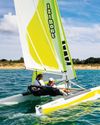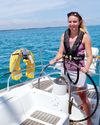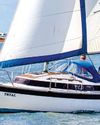
The best way to get a better boat is to improve the one you already have, I have long believed. Given many vessels are not set up as efficiently as they could be, this a realistic proposition for many owners, often without spending a great deal of time or money. The result can be that less effort is needed to sail the boat, along with simplified and quicker manoeuvres such as reefing and in some cases even tacking or gybing.
As a first check it’s worth taking a careful look at the running rigging to ensure it all works smoothly. One of the most common problems I’ve seen is with lines that at some stage in the boat’s history have been replaced with those a size (or even two) larger than blocks and other fittings were designed for, resulting in a full-on festival of friction. Happily, in this case the problem is easily remedied with rope of the correct dimensions.
In any case, it’s always worth taking a close look at anything that might create friction in the system. Strategically replacing low-grade blocks, or changing to a Dyneema line a size smaller can make a huge difference. You may also find blocks, or even masthead sheaves, that have seized, or where plastic pulleys have succumbed to UV degradation. In the latter case many of these may have to be replaced, although with patience it’s often possible to get seized blocks working again.
Sticky sail slides can make hoisting, lowering and reefing the mainsail a bigger and more frustrating task than necessary. Usually a quick application of spray-on lubricant is all that’s needed to get them working smoothly, making a dramatic difference. A so-called ‘dry’ lubricant is best, but silicone spray or even WD40 will do at a stretch.
Esta historia es de la edición August 2022 de Practical Boat Owner.
Comience su prueba gratuita de Magzter GOLD de 7 días para acceder a miles de historias premium seleccionadas y a más de 9,000 revistas y periódicos.
Ya eres suscriptor ? Conectar
Esta historia es de la edición August 2022 de Practical Boat Owner.
Comience su prueba gratuita de Magzter GOLD de 7 días para acceder a miles de historias premium seleccionadas y a más de 9,000 revistas y periódicos.
Ya eres suscriptor? Conectar

Orca sink yacht in Strait of Gibraltar
Spain's maritime rescue service, Salvamento Maritimo, has reported that a 15m (49ft) yacht sank in Moroccan waters in the Strait of Gibraltar following interaction with a pod of orca.

No kill cord or lifejackets were worn during fatal powerboat crash
A kill cord and lifejacket are useless unless worn-that's the warning from the Marine Accident Investigation Branch (MAIB), following its investigation into a powerboat crash that killed a 32-year-old woman and five-year-old girl on 2 October 2022.

Multihull sail work
Brush up on multihull sailing skills before heading off on charter with Gavin Le Sueur's guide to spinnaker handling, tacking and gybing

Five top causes of engine failure and how to prevent them
Jake Kavanagh talks to Sea Start marine engineer Nick Eales about how to avoid the five major causes of an engine breakdown at sea

Sail the Atlantic with strangers
Would you sail across the Atlantic with someone you've just met? Ali Wood meets the cruising crews who've done just that

IZIBoat: simple sailing
Rupert Holmes sails an innovative catamaran design intended to widen participation in sailing among those with little time to get on the water in more conventional craft

30 WAYS TO GET AFLOAT
From tall ships to small dinghies, you needn't own a boat to sail. Ali Wood looks at the options, and how skippers can also find crew

Boats for restoring under £20,000
Duncan Kent picks the best sub-35ft sail and power boats to look for when aiming to undertake a restoration on a budget

Seaworthy dinghies for less than £500
For low cost traditionally-styled GRP trailer-sailers, consider the Foreland and the Otter available at bargain basement prices

Playing with coloured sails
Maintaining an hourglass-shaped balloon and ratcheting up the log numbers